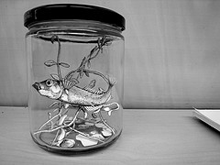A tiny fish common in European streams may learn in a more sophisticated way than has ever been recorded among animals and which mimics human learning. In a study published in the journal Behavioral Ecology, scientists found that the nine-spined stickleback fish used the success and failures of their peers to gauge where they should seek food. The fish were shown to display a type of learning known as "hill-climbing," in which an entity continually looks for a better solution to a problem; in this case, one fish copied others that were more successful in finding food. Researchers caught 270 nine-spined sticklebacks in Leicester, England. The fish were organized into experimental groups. These fish groups then took turns as either free swimmers in a tank with worm-yielding feeders at the end, or as "learners" in a transparent, partitioned-off area of the specially designed tank. One of the two feeders released ...
Stickleback Fish Learn Like Humans, Despite Tiny Little Fish Brains
Discover how the nine-spined stickleback fish display advanced learning abilities, mimicking human methods in their hunt for food.
More on Discover
Stay Curious
SubscribeTo The Magazine
Save up to 40% off the cover price when you subscribe to Discover magazine.
Subscribe













